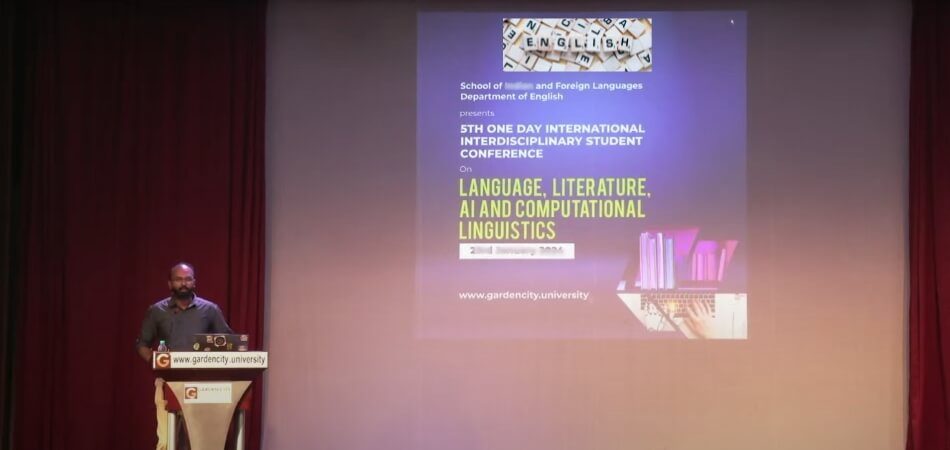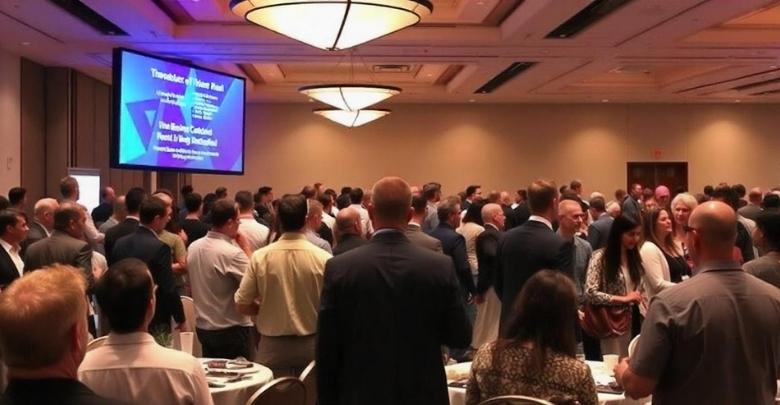A language literature conference is a lively event for scholars, educators, and enthusiasts passionate about literary studies. These conferences provide an ideal platform for academic exchange, networking, and exposure to innovative research. But the question is: Why should I attend a language literature conference?
Attending a language literature conference offers a platform for academic exchange, networking, and exposure to innovative research. Engage with fellow scholars, gain insights, and contribute to literary studies advancement.
Curious to learn more about the benefits and experiences awaiting you at a language literature conference? Follow along as we explore deeper into why attending these conferences can be such a valuable experience for your academic and professional journey.
Signification of Language Literature Conference
The significance of language literature conferences reveals a lively platform for scholarly exchange. Research collaboration among researchers from diverse backgrounds is promoted by these conferences, which are often international academic conferences. Participants explore literary analysis trends and methodologies, and they often discuss at the upcoming international language literature conferences that provide further opportunities for collaboration.
The language literature conference promotes creativity and innovation within the academic community. These events facilitate the exchange of insights and discoveries, enriching the collective knowledge base. Attendees gain invaluable exposure to innovative research, inspiring fresh perspectives and approaches to literary studies.
Conferences on language and literature encourage interdisciplinary discussion. Across disciplinary boundaries, scholars explore language and literature’s multifaceted nature. This interdisciplinary synergy encourages holistic perspectives, resulting in significant advancements in literary scholarship and beyond.
Why Should I Attend a Language Literature Conference?
Attending a language literature conference is an excellent opportunity for anyone passionate about literary studies. These events bring together scholars, educators, and enthusiasts to share knowledge and insights. Before attending the event, ask yourself, “Why should I attend a language literature conference?” and here are the reasons why you should consider attending.
Networking Opportunities
One of the most significant advantages of attending a conference is the chance to network with peers, scholars, and industry professionals. You’ll meet individuals from various backgrounds who share your interests and passions. Building relationships at these events can lead to future collaborations, mentorships, and even job opportunities. Engaging with others in your field promotes a sense of community and opens doors to new possibilities.
Exposure to Advanced Research
Conferences are platforms where the latest research findings are presented. Attending these sessions exposes you to the latest developments in language and literature. You’ll learn about new theories, methodologies, and approaches that can inspire your work. Staying updated with the latest trends is essential in any field, and these events provide a wealth of knowledge in a short period.
Feedback on Your Work
If you’re presenting your research, conferences offer an excellent opportunity to receive constructive feedback from experts and peers. Engaging in discussions about your work allows you to gain insights that can help refine your ideas and improve your research. The input you receive can be invaluable in guiding the direction of your projects and enhancing their overall quality.
Professional Development
Many conferences feature workshops and sessions focused on skill development. These can range from improving your writing and presentation skills to learning about new technologies and tools relevant to your field. Attending these sessions can equip you with practical skills that enhance your professional portfolio and make you more competitive in the job market.
Publication Opportunities
Participating in conferences often comes with the possibility of publishing your work. Many conferences have associated journals or proceedings where you can submit your research for publication. This not only increases your work’s visibility but also contributes to your academic credentials. Getting published can be a significant boost to your career, particularly if you’re an early-career researcher.
Access to Diverse Perspectives
Conferences attract individuals from various cultural and academic backgrounds. This diversity enriches discussions and broadens your understanding of different perspectives within the field. Engaging with a range of viewpoints can inspire innovative ideas and challenge your assumptions, ultimately enhancing your research and critical thinking skills.
Enhanced Public Speaking Skills
Presenting at a conference is an excellent way to improve your public speaking and presentation skills. Whether you’re addressing a small group or a large audience, these experiences can build your confidence and help you articulate your ideas more clearly. Effective communication is crucial for anyone working in academia or the business world.
Inspiration and Motivation
Attending a conference can be invigorating. Being surrounded by passionate individuals who share your interests can reignite your enthusiasm for your field. Engaging in stimulating discussions and witnessing innovative research can inspire new ideas and motivate you to pursue your goals with renewed vigor. The benefits of language literature conferences can truly be transformative, providing both personal and professional uplift.
Career Advancement
Conference connections can directly impact your career development. Whether it’s through networking with potential employers, finding collaborators for your projects, or learning about job openings, conferences can serve as a launching pad for your career. Many attendees have found job opportunities or been offered positions based on their participation in conferences.
Building a Stronger Academic Community
Attending conferences helps strengthen the academic community. Engaging in discussions, sharing knowledge, and collaborating with others encourages a sense of belonging and purpose. Contributing to the collective knowledge in your field enhances the community and reinforces the importance of academic discourse.
Attending a language literature conference is more than just a professional obligation; it’s an investment in your growth and future. With opportunities for networking, learning, and collaboration, these conferences can significantly improve your academic journey. Whether you’re seeking inspiration, looking to improve your skills, or aiming to expand your professional network, the benefits are immense. Take advantage of the chance to engage with others in your field, share your work, and grow both personally and professionally.
Language Literature Conferences: Who Should Attend?
Language literature conferences are lively events that bring together individuals passionate about literary studies. These events provide opportunities for learning, networking, and professional growth.
So, who should attend a language literature conference? Here’s a look at the different types of attendees who can benefit from these enriching experiences.
Scholars and Researchers
Scholars and researchers are a vital part of language literature conferences. They present their latest findings and engage with peers. This exchange helps refine their research. Conferences also offer a platform to stay updated on new developments.
Educators and Professors
Educators and professors attend to improve their teaching practices. They gain insights into the latest trends and methodologies. This knowledge can be applied in their classrooms. Conferences also provide networking opportunities with fellow educators.
Graduate Students
Graduate students benefit immensely from attending these conferences. They gain exposure to current research and methodologies. This helps them in their academic pursuits. Networking with established professionals can lead to mentorship opportunities.
Authors and Writers
Authors and writers find value in attending language literature conferences. They can share their work and receive constructive feedback. It’s also an opportunity to learn from fellow writers. Networking with publishers and agents can advance their careers.
Librarians and Archivists
This conference is attended by librarians and archivists to stay up-to-date with the latest literary trends. As a result of their training, they gain knowledge that can be used in the curating of collections. Conferences also offer professional development opportunities. Networking with scholars and authors is an added benefit.
Publishers and Editors
Publishers and editors attend to discover new talent and trends. It is a great opportunity for them to connect with potential collaborators and authors. There is a wealth of information to be gained from these conferences about the latest literary movements. It’s an excellent opportunity for scouting and networking.
Literary Enthusiasts
Literary enthusiasts attend for the love of literature. They enjoy learning about new research and trends. These events offer a chance to meet like-minded individuals. It’s an enriching experience for anyone passionate about literature.
How to Attend a Language Literature Conference?
Attending a language literature conference can be an enriching experience that improves your academic and professional journey. Here’s a step-by-step guide to help you navigate the process smoothly.
- Research Conferences: Start by identifying conferences that align with your interests in language and literature. Look for reputable organizations and check their websites for upcoming language literature conferences. Make sure to note the conference themes, locations, and dates.
- Register Early: Once you’ve found a suitable conference, register as early as possible. Early registration often comes with discounts and guarantees your spot. Follow the instructions carefully and provide all necessary information.
- Prepare Your Presentation: If you plan to present, ensure that your paper or presentation is well-prepared. Practice your delivery to build confidence and keep your content clear and concise.
- Gather Necessary Documents: Ensure that you have all required documents, such as your registration confirmation, travel tickets, and accommodation details. If you’re traveling internationally, check your visa requirements.
- Plan Your Travel and Accommodation: Book your travel and accommodation in advance to secure the best rates. Consider staying close to the conference venue to save time and reduce travel stress.
- Engage Actively: During the conference, attend sessions, workshops, and networking events. Don’t hesitate to introduce yourself to fellow attendees and speakers. Bring business cards to exchange contact information.
- Follow Up: After the conference, reach out to new connections via email or social media. Share your thoughts about the conference and express interest in staying in touch.
By following these steps, you can make the most of your experience at a language literature conference, enabling valuable connections and expanding your knowledge in the field.
Tips for Maximize Your Language Literature Conference
Attending a language literature conference is a fantastic opportunity to learn, network, and grow professionally. To make the most of your experience, you have to plan and engage actively. Here are some tips to help you maximize your time at a language literature conference.
- Plan Ahead: Research the conference schedule and sessions in advance. Prioritize those that matter most to you. Make sure you don’t miss key presentations by finding upcoming language literature conferences in advance, which can be especially beneficial for understanding culture conferences and improving your insights further.
- Network Actively: Take every opportunity to meet new people. Introduce yourself to fellow attendees, speakers, and organizers. Building connections can lead to future collaborations and opportunities.
- Participate in Workshops: Workshops offer hands-on learning experiences. They provide practical skills and insights that can increase your work. Make sure to engage and ask questions.
- Take Notes: Bring a notebook or use a digital device to take notes. Document key points, ideas, and contacts. Reviewing your notes later helps reinforce what you’ve learned.
- Ask Questions: Don’t hesitate to ask questions during sessions. This shows your interest and helps clarify any doubts. It also encourages a more interactive and engaging discussion.
- Explore Exhibits: Visit the exhibits and booths at the conference. These often feature new publications, tools, and resources. Engaging with exhibitors can provide additional learning opportunities.
- Follow-Up: After the conference, follow up with new contacts. Send emails or connect on social media. This helps maintain the relationships you’ve built and opens doors for future interactions.
Frequently Asked Questions (FAQs)
Attending a language literature conference can be incredibly enriching for anyone involved in the field. Here are some frequently asked questions and their answers to help you understand the benefits and what to expect.
How Can Networking at A Conference Help My Career?
Networking at a conference allows you to meet scholars, educators, and professionals. These connections can lead to collaborations, mentorships, and new opportunities. Building a strong network is invaluable for career advancement.
What Can I Learn from Presenting My Research?
Presenting your research at a conference allows you to share your findings with a wider audience. It provides valuable feedback that can improve your work. Additionally, it boosts your confidence and public speaking skills.
Why Is It Important to Stay Updated with New Research?
Staying updated with new research keeps you informed about the latest trends and developments. It helps you remain relevant in your field. Being knowledgeable about current studies can inspire your research and ideas.
How Do Language Literature Conferences Promote Interdisciplinary Discussion?
Language literature conferences often include diverse topics that cross disciplinary boundaries. This encourages collaboration between scholars from different fields. Such interdisciplinary discussion promotes in-depth knowledge and innovative approaches.
What Kind of Sessions Can I Expect at A Language Literature Conference?
You can expect a variety of sessions including keynote speeches, panel discussions, and workshops. Each session offers insights into different aspects of language and literature. Engaging in these sessions broadens your knowledge base.
Why Should I Attend a Language Literature Conference if I Am a Literary Enthusiast?
As a literary enthusiast, attending a conference allows you to engage with like-minded individuals. It provides insights into new research and trends. This enriching experience deepens your appreciation and understanding of literature.
Final Thought
Attending a language literature conference offers numerous benefits, from academic exchange to networking opportunities. Scholars, educators, students, and literary professionals can all gain valuable insights and skills. These conferences also provide a platform for presenting research and staying updated on the latest trends.
So, why should I attend a language literature conference? Engaging with fellow scholars, learning from experts, and contributing to the advancement of literary studies are just a few reasons. These events encourage professional growth and create opportunities for future collaborations.
The importance of language literature conferences for literary studies cannot be overstated. There are plenty of opportunities at these conferences to improve your knowledge, network with peers, or present your work. By planning and participating actively, you will make the most of your conference experience.








